Zambezi Read online
Page 3
Nelson sniffed the air, reassured himself all was well in his kingdom and, content in the knowledge that his wives were either caring for his children or hunting for his supper, laid his big maned head down and fell asleep.
Lions. Chris shook her head. For all their majesty, the big cats were also some of the most boring animals in Africa to watch and study – most of the time. Nelson was doing what every lion did for about eighteen hours a day – nothing. But it was those rarely glimpsed moments of the hunt and the kill, where the members of the pride came together instinctively as one to bring down their prey in a tawny blur of dust and blood, that made her rise before dawn six days a week and drive out into the bush. Taking her lead from the lion, Chris laid her head back and closed her eyes.
Her home for the past eighteen months had been a caravan parked under a marula tree in the camping ground of Pretoriuskop rest camp in the south-west of the Kruger National Park. An American university had provided funding for research into the feeding habits of lions and other large predators in the southern part of South Africa’s premier park. A particular focus was the prevalence of humans as prey for large predators. The reserve’s eastern boundary was also the border with Mozambique, and illegal immigrants from that country had for decades been risking the natural hazards of the bush in their quest to find their fortunes in comparatively prosperous South Africa.
Even though Mozambique’s prolonged and bloody civil war had long since ended, the flow of illegals had continued unabated. Many of Kruger’s lions, beloved and photographed by tourists from around the world, had feasted on the flesh of luckless refugees. Chris wanted to find out how many lions were man-eaters, and whether there were individuals or prides that now specialised in hunting humans. She had interviewed rangers who had come across human remains on the veldt and, with the help of the local police, with whom she maintained an excellent relationship, she had also been able to speak to detained illegal immigrants about their brushes with wildlife. So far she had not actually seen the remains of a human killed by a lion. That was just fine by her.
The noise of a vehicle engine woke her from her doze. A game-viewer – an open-top Land Rover with a canvas awning roof and tiered bench seats crammed with tourists – pulled up in front of her truck. Chris waved when she recognised the driver.
The tourists were open-mouthed with awe at the sight of the lion. However, their silent fascination soon gave way to chattering in at least three languages. Cameras flashed and a child shrieked as Nelson rose on his front legs and yawned. He looked at the game-viewer, considered moving, but couldn’t be bothered. He fell asleep again.
Chris knew most of the safari guides and rangers in her part of the park, including the ‘jeep jockey’ driving this vehicle, a South African guy named Jan. He was young, blond and attractive. Not her type, but he looked good in his short khaki shorts. Jan was sitting up on the backrest of his seat, facing his passengers and explaining some facts about lion behaviour to them.
‘We’re safe as long as we stay in the vehicle, but if you got out and tried to pat the big kitty it would be the last decision you ever made in your life,’ Jan said. There were a few nervous laughs from the crowd.
Jan started his vehicle and edged it around Chris’s until he was parked beside her window.
‘Morning, Professor,’ he said, smiling.
‘Had much luck, Jan?’ Sometimes the jeep jockeys were a pain in the ass, getting too close to animals in order to present a better photo opportunity for the tourists, and scaring off the game in the process. Jan, she recalled, was studying zoology and seemed to have a genuine respect for wildlife.
‘Only need a leopard and we’ll have nailed the big five this morning.’
‘Head via the Klipspringer kopjes on your way back to camp. That big male was out on a rock sunning himself this morning.’
‘Thanks, Professor. I’ll buy you a beer with my tips if we catch up with him. Hey, how’s Miranda doing up in Zim? You heard from her lately?’
‘She’s fine. Working hard and much better able to concentrate on her studies now that she’s away from you guys.’ Chris attracted her fair share of attention from the men in the national park, but Miranda, blonde, blue-eyed, gorgeous and thirteen years her junior, sent the South African young bloods into a frenzy of competition for her affections whenever she passed through Kruger.
Jan laughed. ‘She wasn’t interested in any of us last time she was here. Oh, by the way, I nearly forgot. The gate guard said there’s a message for you at reception.’
Chris checked her mobile phone. She was out of range, even though much of the park was now covered by the cellular phone network. ‘Thanks, Jan. I’d better be getting back, then. Good luck with your spotting.’
She followed the game-viewer back onto the main tarred road running through the park, then overtook Jan and drove as fast as she dared back towards Pretoriuskop camp. When she was close to the camp and its tower, her mobile phone beeped. Chris pulled over, ignoring the bull elephant snapping branches from a tree a scant fifty metres from her. She dialled the number to retrieve her message.
It was the embassy. A female secretary started to dictate the number for her to call, but she cut the woman off, ended the call and started to dial again. She knew the number by heart. Bad news, Chris thought. The embassy only ever called when something terrible had happened.
Afghanistan
Jed’s spirits were high as he walked down Disney Parade, the main thoroughfare through Bagram Air Base. The road was named not after the cartoon creator, but a US Army soldier who had been killed in a welding accident in the early days of the American occupation of the old Russian base.
The jet engines of a C-17 transport aircraft screamed at full pitch and the fat-bellied bird roared down the runway Jed smiled. He had just visited the APOD, the aerial point of debarkation, and confirmed his seat on a flight out of Afghanistan that night.
The dust by the side of the road was ankle-deep and as fine as talcum powder. It broke over his boots like the foamy edge of an ocean tide. The wind picked up and he shielded his eyes from the flying grit. He could no longer see the foothills of the Hindu Kush mountains, couldn’t even see two hundred metres down Disney A convoy of Hummers rumbled down the road, stirring up even more dust. The paratroopers manning the .50 calibre machine-guns and Mark 19 automatic grenadelaunchers mounted in the turrets of each vehicle had their faces wrapped in Arab shamags, their eyes protected by goggles. He would not miss Afghanistan.
From the runway to his left, on the other side of the old Russian aircraft hangars, he heard the whine of helicopter turbine engines winding up to full power. Another patrol, another search for an enemy who was both hard to find and hard to identify. He thought of the men he had killed on his last mission, a few days earlier. He pressed his fingers to his eyes to wipe out some particles of dirt, and to squeeze out the image of the face of the man he had shot at close range.
He had killed before. He had called in airstrikes on Iraqi Republican Guard positions and armoured columns during the first Gulf War. He had seen the burned and shattered bodies of some of his victims, become hardened to the grotesque face of death, but he had never been close enough to one of his victims to look into his eyes. He had no doubt about himself as a soldier, the righteousness of his cause, or the fact that the man would have shot him without blinking if he had been quicker on the draw.
The rangers who had swept the compound the day after the mission had found two Hongying 5 surface-to-air missiles, Chinese knock-offs of the portable shoulder-launched Soviet SAM 7, or Strela. Although based on nineteen sixties technology, the lightweight missiles were still a serious threat to modern aircraft. There was no doubt the team had hit the right target at the right time and probably saved Coalition lives. But still the face of the man haunted him. He supposed it was only normal.
Two Black Hawks and an Apache rose above the dust stirred up by their rotor wash and headed south. Khost, he guessed. Afghanistan mi
ght have dropped off the front pages of the world’s newspapers, but Americans were still fighting and dying there. He wondered how long the war would go on. He believed the operations in this blighted country had made a real dent in Al Qaeda’s ability to conduct terrorist operations around the world, but their enemy was like the mythical Hydra, growing a new head as soon as one was lopped off. The war, such as it was, had spread to Asia and Africa, where terrorists had tried to down an Israeli airliner in Kenya with weapons identical to the ones discovered after his last mission.
He thought about Africa. It was ironic that at a time when much of the rest of the world was preparing itself for possible terrorist attacks, Miranda was probably safer in strife-torn Zimbabwe than anywhere else.
‘Jed!’ a man’s voice called from behind him.
Jed turned. ‘Morning, sir. Hell of a day for a walk,’ he said to his commanding officer, a full colonel who had served in the Army since Vietnam. Jed had enormous respect for the old man. A veteran of too many firefights to count, with more combat experience than any of them, he was also a devoted family man who cared for his soldiers like they were his sons. He almost always had the makings of a smile on his face, no matter how bad the situation.
‘Just got a signal from the States, Jed,’ the colonel said. ‘Thought I’d better come find you in person.’
Jed looked into the other man’s eyes. There was no smile.
‘It’s not good, Jed. There’s been an accident …’
Chapter 2
Jed drained the last of the Scotch from the plastic tumbler and let the single ice cube slide into his mouth as the fasten-seatbelt sign chimed and lit up. He turned and stared out of the window of the United Airlines 737-300 and chomped on the ice as the plane descended through the clouds.
He needed a clear head for his meeting with Patti – she had sounded incoherent on the phone – but at the same time he had needed a couple of Scotches to calm his own nerves for the flight. A combat veteran and paratrooper with more than two hundred jumps on his log card he might have been, but he was still scared of flying. Also, there was the constant pain, a feeling deep in his core, every time he thought of Miranda.
She couldn’t be dead, he told himself over and over again. There was no body, according to Patti, who desperately wanted to believe Miranda was hiding, or maybe alive but lost in the African bush.
‘I don’t know how to tell you this,’ the CO had said to him on the dusty roadside at Bagram, ‘but it seems Miranda has been killed by a lion in Africa.’
For a moment he had thought the colonel was joking. Everyone in the unit knew his daughter was researching carnivores in Africa. The guys in Special Forces were hard men and, Lord knew, some of them had twisted senses of humour, but one thing a guy would never do was joke about another man’s kids.
It was no joke, but it was absurd. Miranda had lived in the African bush for six months and she had repeatedly told Jed in her emails that she knew how to take care of herself. Also, he remembered her reassuring him in one message that when she camped out in the field there was always an armed ranger or safari guide in the party. What had happened to the guard? For the man’s own sake, Jed hoped he was dead. If not, he would be by the time Jed finished with him.
Boston looked cold and bleak through the gaps in the cloud cover. He had never liked coming here, although the thought of meeting Miranda had always made the trip worth it. Nightmarish scenes played over and over in his head as he prepared to face Patti. The thought of his baby being torn apart by a wild beast was too much to bear. He screwed his eyes tight for a couple of seconds to rid himself of the recurring image. He was tired, fall-down tired, but there would be time to sleep on the next flight, later that evening.
He pulled his green suit bag from the overhead locker. He had about an hour with Patti. He doubted he could take more than that.
She was waiting for him when he emerged from the air bridge. They stared at each other for a few seconds. She was wearing jeans and high-heeled boots, a white T-shirt and a cropped black leather jacket. Her golden hair was piled carelessly high, stray wisps framing her face. She was a little fuller in the face, but still as beautiful as the day they had met. He saw Miranda in her eyes and mouth. It was all he could do to fight back the tears.
Patti Vernon had transferred to his school in his senior year. They had started dating a week after she arrived. She lost her virginity to him on prom night. It seemed as though they would live happily ever after, until he made a spur of the moment decision to join the Army instead of going to college.
They had planned to marry as soon as possible, and he wanted to start earning money. She had reluctantly become a soldier’s bride, on the promise that he would eventually go to college with the money he made from his first enlistment.
Their teenage passion lasted for the first year of marriage. Patti was on the pill and took it religiously, except for the weekend between Jed’s basic training and advanced infantry training. They went away to a country hotel and she forgot her oral contraceptive packet. They risked it. Patti fell pregnant.
Jed loved his baby girl, but he was being seduced away from his overtired wife, who seemed to blame him for the fact that she had to drop out of college and could barely afford to make ends meet.
Domestic duties left Jed cold, particularly when compared with the excitement of airborne school at Fort Benning, Georgia, and ranger training in the Florida swamps.
Grenada, in 1983, was the first time America had seriously flexed its military muscles since Vietnam. The brief conflict also marked the beginning of the end of Jed and Patti’s marriage. The Army had shaken off the shame of defeat in south-east Asia and Jed Banks had discovered that he was born to be a warrior.
Patti’s lower lip started to tremble and Jed walked to her. He folded her in his arms as she started to cry.
‘Oh, Patti,’ was all he could say.
‘Jed, it can’t be true.’ She leaned back and wiped her face with the back of her hand.
‘I know, Patti. I can’t believe it myself.’
‘She’s all right, Jed, I know it. She might be hurt, but she’s not dead.’
Jed wanted so much to believe Patti was right.
‘Let’s find somewhere to sit down. Are you alone?’
‘Rob’s outside. It’ll take an age for him to park the car. How long have you got?’
‘Less than an hour, and I’ve got to check in for my connection to Johannesburg. Let’s get a coffee.’
He ushered her across to a café, his hand on her elbow. He sat her at a table and she blew her nose on a tissue.
‘OK, tell me about this email you got,’ Jed said when he returned from the counter with two black coffees.
She sniffed again, then rummaged in her big leather handbag. ‘It’s from a professor. Wallis is her name, Christine.’ Patti pulled a crumpled print-out from the bag and smoothed it out on the laminated tabletop. ‘Miranda met her during her final year at college – said the professor ran a postgraduate program for zoology majors in the Kruger National Park in South Africa. Professor Wallis was the one who put Miranda onto this research project in Zimbabwe.’
Jed nodded. He remembered Miranda’s description of the program, if not the names of the people involved. Zimbabwe had been short of foreign aid for years, because of its political and security situation, and it seemed the few foreign wildlife researchers left in the troubled nation were welcoming with open arms any contributions or volunteers. Miranda had mentioned that she was being funded by a US-based wildlife conservation group, as an offshoot of the program being run by Christine Wallis in South Africa. He couldn’t remember the name of the organisation. ‘So what did the professor have to say?’
‘Well, the media were reporting Miranda’s …’ Patti’s lip began to tremble again.
‘It’s OK, Sugar,’ he said, a little surprised at how easily the old nickname came back. ‘I saw the reports.’ He had printed them off at Bagram. ‘They said it appeared
she had been sleeping with her tent flap open and that a lion had entered.’
Patti nodded, took a deep breath and held up the paper. ‘Professor Wallis says, “These reports surprised me greatly as Miranda is always so sensible when she spends time in the field. She always made a point of making sure her tent was completely secure, and was well aware of a recent case in which a young man was taken by a lion because he slept with his tent open on a particularly hot evening.”’
Jed nodded. He wondered why anyone would sleep in a tent when there were lions around. ‘I don’t know, Patti. People get lazy when they get out into the field.’ That was true. He’d had a buddy who had been bitten by a snake at ranger school because he had left his sleeping bag unrolled during the day, allowing the reptile to slither inside.
‘This goddamned professor sent her there, Jed, and now she feels guilty. That’s what I know. But she does say that the press reports don’t tally with what she knew of Miranda.’
Jed took the offered print-out and scanned it. ‘Says she’s going to go to Zimbabwe to talk to the authorities herself.’
‘Find her, Jed. Talk to her. Find out if Miranda could still be alive. I know she’s not dead, and the police and park rangers say they haven’t found her body.’
Jed nodded. There were explanations for that, but he didn’t want to voice them in front of Patti.
She was conveniently ignoring the media reports that human remains had been found at the scene of the attack. Now wasn’t the time to remind her. ‘I’ll do what I can, Patti. There will be arrangements to make with the embassy in any case.’

 The Cull
The Cull Blood Trail
Blood Trail Red Earth
Red Earth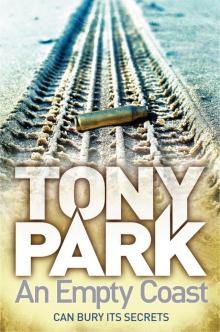 An Empty Coast
An Empty Coast Dark Heart
Dark Heart African Sky
African Sky The Delta
The Delta Captive
Captive Ivory
Ivory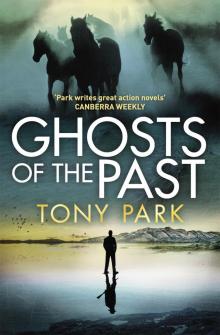 Ghosts of the Past
Ghosts of the Past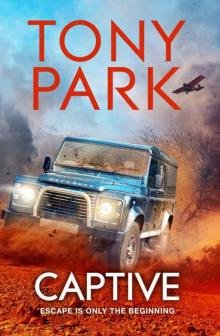 Captive_A High-octane And Gripping African Thriller
Captive_A High-octane And Gripping African Thriller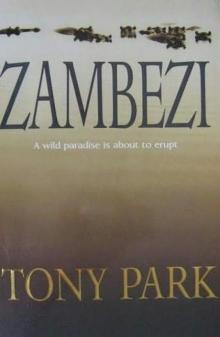 Zambezi
Zambezi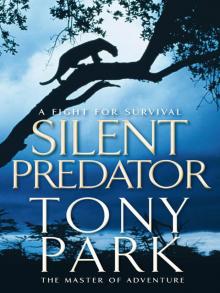 Silent Predator
Silent Predator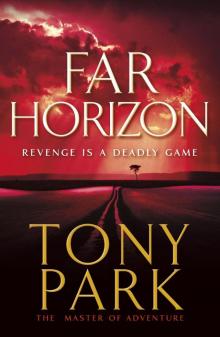 Far Horizon
Far Horizon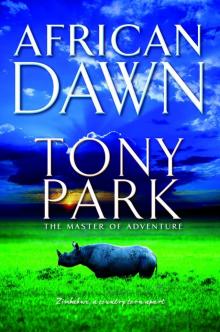 African Dawn
African Dawn The Prey
The Prey Safari
Safari